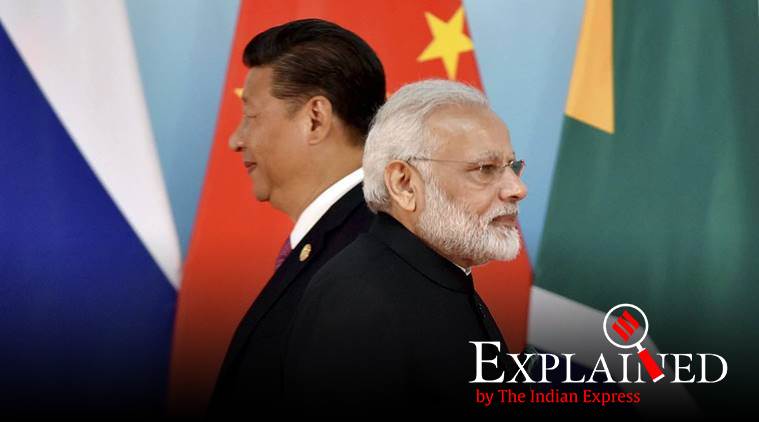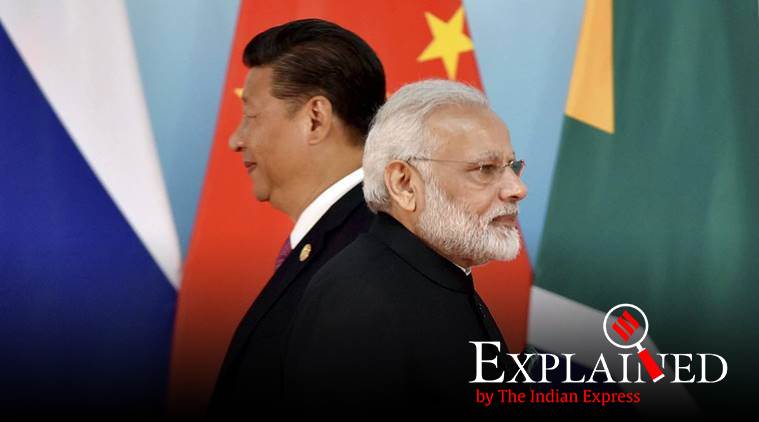
[ad_1]
| New Delhi |
Updated: April 23, 2020 4:51:26 am
 The move to impose additional requirements for certain countries is seemingly unprecedented. So far, India has imposed such measures on investments into certain sectors, according to legal experts.
The move to impose additional requirements for certain countries is seemingly unprecedented. So far, India has imposed such measures on investments into certain sectors, according to legal experts.
India recently revised its Foreign Direct Investment (FDI) policy with the objective of preventing “opportunistic takeovers” from firms hit by the lockdown induced by the COVID-19 outbreak. The move has upset China, which has termed it a violation of international trade principles (The Indian Express, April 21). A look at the move, and the implications:
What was the amendment?
On Saturday, the government said firms in neighboring countries wanting to invest in Indian companies would first need its approval. An entity of a country that shares a land border with India can now invest in firms here “only under the Government route”. This also applies to “beneficial” owners – even if the investing company is not located in a neighboring country, it would still be subject to these conditions if its owner is a citizen or resident of such a country.
While the note did not name any country, analysts see the amendments as aimed at possible Chinese investments. The decision came days after China’s central bank, the People’s Bank of China (PBoC) had raised its shareholding in HDFC to over 1 per cent. HDFC vice chairman and CEO Keki Mistry had said that PBoC had been an existing shareholder, owning 0.8% as of March 2019.
China’s FDI has grown five-fold since 2014 and, as of December 2019, its cumulative investment in India exceeded $ 8 billion – “far more” than investments by other countries that share borders with India, according to the Chinese government. A Brookings India paper pegs the total current and planned Chinese investment in India at over $ 26 billion.
What was China’s response?
China has called for India to revise these “discriminatory practices” and treat investments from different countries equally. “The additional barriers set by Indian side for investors from specific countries violated WTO’s (World Trade Organization) principle of non-discrimination, and go against the general trend of liberalization and facilitation of trade and investment. More importantly, they do not conform to the consensus of G20 leaders and trade ministers to realize a free, fair, non-discriminatory, transparent, predictable and stable trade and investment environment, and to keep our markets open, ”said Ji Rong, spokesperson for the Chinese Embassy in India.
What is India’s argument?
India maintains the policy is not aimed at any one country and that the move is aimed at curbing “opportunistic” takeovers of Indian firms, many of which are under strain.
“The amendments are not prohibiting investments. (We have) just changed the approval route for these investments. There are many sectors in India that are already subject to this approval route, ”a senior government official had said, adding that“ many ”other countries were taking such measures.
What have other countries done?
Before India, the European Union and Australia had initiated similar measures. These, again, were seen as being targeted at Chinese investments.
On March 25, the European Commission issued guidelines to ensure “a strong EU-wide approach” to foreign investment screening at such a time. The aim was to preserve EU companies and critical assets, notably in areas like health, medical research, biotechnology and infrastructures essential for security and public order, without undermining the EU’s general openness to foreign investment.
On March 30, Australia temporarily tightened rules on foreign takeovers over concerns that strategic assets could be sold off cheaply. This followed warnings that distressed Australian companies in the aviation, freight and health sectors could become vulnerable to buyouts by state-owned enterprises, especially China. All foreign takeover and investment proposals will now be scrutinized by Australia’s foreign investment review board.
Spain, Italy and the US too have implemented investment-related restrictions, according to Khaitan & Co partner Atul Pandey.
Is there any ground for the argument that India’s move is discriminatory?
Some experts note that the amendments apply only to bordering countries. “Now, there are different sets of procedures for the same set of investments based on which country the company is investing from. This is where the potential issue of discrimination arises, ”said a trade expert on condition of anonymity. “While India can discriminate in favor of domestic investment, discrimination against certain countries for non-security reasons may not be seen favorably on the global stage.”
There could also be a potential violation of non-discriminatory obligations under the General Agreement on Trade in Services, if the sectors concerned involve services, the expert said. “Most of the other countries that have tightened their investment regulations have done so unanimously, which means that it would apply to all countries.”
Has India done this before?
The move to impose additional requirements for certain countries is seemingly unprecedented. So far, India has imposed such measures on investments into certain sectors, according to legal experts.
For instance, while FDI in pharmaceuticals had been allowed under the automatic route until 2011, the government had mandated approval for any investment coming into the sector from November that year, said Pandey of Khaitan & Co. “This had happened after the government was alerted to intentions by certain overseas firms to increase investments in India’s pharmaceutical industry with an intention to potentially take over these entities. This decision was made with national health security in mind. After the new government was elected in 2014, the policy was liberalized, but even now investment is only allowed up to 74 per cent under the automatic route, ”I added.
In 2010, the government banned FDI in cigarette manufacturing following recent announcements by Japan Tobacco that it would increase stake in its Indian subsidiary to 74 per cent from 50 per cent, according to Singh and Associates senior partner Daizy Chawla. In the past, India has also blocked certain FDI investments during bilateral standoffs with China, according to Pandey.

For all the latest Explained News, download Indian Express App.